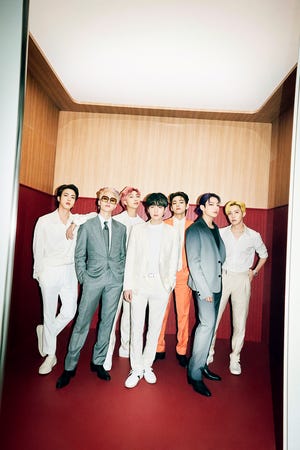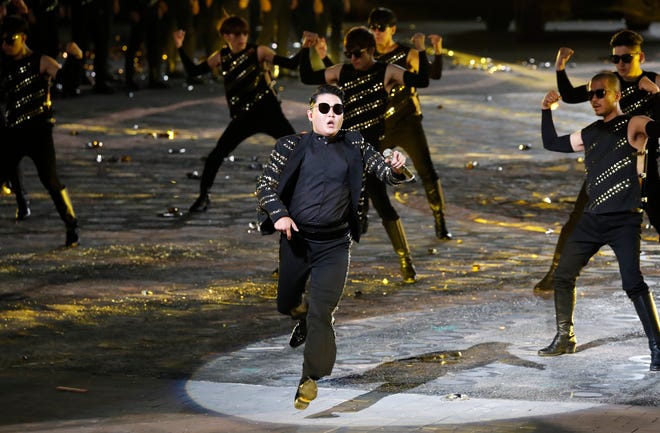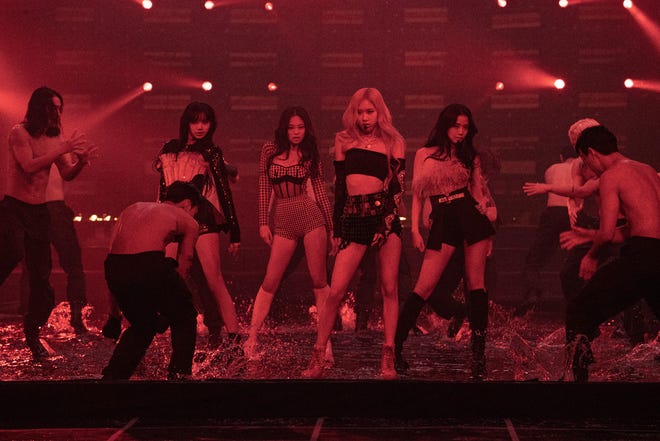Last year, BTS became the first all-South Korean act to top the Billboard Hot 100 with the effervescent funk groove and beyond-contagious K-pop sensibilities of their first English-language single, “Dynamite.”
And that was just the first of three chart-topping entries on that U.S. singles chart in 2020.
Next, they turned up singing in Korean on a chart-topping remix of “Savage Love” by New Zealand DJ/producer Jawsh 685 and American R&B singer Jason Derulo. Then came “Life Goes On,” the first primarily Korean-language song to top the Hot 100.
On May 21, they’re set to drop their second English-language single, “Butter,” which should have no trouble making good on the momentum that’s established BTS as major players in the K-pop revolution that’s taken the world by storm in recent years.
That revolution didn’t happen overnight, of course.
That's not how revolutions work.
It's taken decades to achieve the sort of world domination K-pop is enjoying at the moment.

It's easy to see and/or hear how it got to this. Few genres have fully embraced the euphoric potential of pop music with the unabashed dedication to delivering that sugar rush on which this type of music thrives as K-pop.
In its more infectious moments, it's a technicolor hook explosion on 11 or what NPR once called "a maximalist dreamland" of "constant stimulation."
K-pop makes most Western pop stars seem like they're not even trying.
With BTS about to blow up even bigger, here’s a look back at a handful of key moments on the road to K-pop being what a recent eight-part YouTube documentary series on the genre calls a $10 billion industry.
Who started K-pop?
There's a long tradition of pop music in Korea, from Trot, a form of folk music whose name is derived from the English word foxtrot, to rock acts like the Key Boys, whose Yardbirds-style rockers played well to American GIs in the '60s.
But Seo Taiji and Boys are often credited with modernizing the contemporary music scene of South Korea with their breakthrough single "Nan Arayo (I Know)." Rapping and singing in Korean over new jack swing beats and turntable scratching in an energetic, choreographed video, they clearly paved the way for modern K-pop. Their success with teenagers inspired the Korean music industry to shift its focus to pop that would play well to that age group.
In the YouTube documentary "K-pop Evolution," producer Hong Jong Ho says, "Korean pop music is divided into 'before' and 'after' the debut of Seo Taiji and Boys."
The modern era of K-pop
Formed in 1996, the boy band H.O.T. is credited with ushering in the age of modern K-pop idol culture, in which members of a pop group are assembled by a company, in this case SM Entertainment, and marketed to teenagers.
Their name stands for Highfive of Teenagers.
According to the book "K-Pop: Korea's Musical Explosion," SM Entertainment's Lee Soo-man polled high school students on what they wanted from a pop group. That information was then used to hand-select the members of the group, who then went through rigorous training to achieve their full potential as teen idols.
A year after the launch of SM Entertainment, H.O.T. became the hottest name in K-pop thanks to the contagious bubblegum appeal of 1996's hip-hop-flavored "Candy."
Billboard says they're "typically identified as the first formal K-pop boy band."
That success led to another wave of K-pop idol groups, including S.E.S., a group initially assembled by the folks at SM Entertainment as a female counterpart to H.O.T.
The same year H.O.T. broke through with "Candy," Yang Hyun-suk of Seo Taiji & Boys formed YG Entertainment. A year later, Park Jin-young launched JYP Entertainment.
BTS' label, Big Hit Music, came much later, launched in 2005 by Bang Si-hyuk. Thanks in large part to the international success the label has enjoyed with BTS, it recently purchased the management company that handles Justin Bieber and Ariana Grande.
K-pop makes its first appearance in Billboard
The term K-pop made its first appearance in the pages of Billboard magazine in 1999 in an article on South Korea lessening restrictions on Japanese acts performing in the country. Kim Chang-Hwan, a producer, is quoted as saying, "The rock-oriented J-pop scene is not what melody-oriented K-pop listeners are asking for."
Except he didn't really call it that.
Looking back in 2019 on the article he'd done as Billboard's South Korea correspondent, Cho Hyun-jin explained that Kim had used the Korean term gayo and that he and an editor were brainstorming ideas for something that sounded a bit more accessible.
“Personally, I didn't hear the term ‘K-pop’ before," Cho recalled. "It might have been used. I read some articles when I was working on my pieces that the word ‘K-pop’ was used by the music industry insiders. But to tell the truth, I never heard it personally.”
What is K-pop?
Obviously, K-pop means Korean pop music, but the term is more fluid than that.
When Cho started using the term he soon found himself applying it to any pop act out of South Korea, a usage that lingers.
But to many, it applies specifically to K-pop idol culture. As Cho explained in Billboard, "I guess the term ‘K-pop’ really started to define the agency-produced or managed idol bands, or sometimes solo acts."
What are K-pop stans?
Among the key factors in spreading the gospel of K-pop across the universe has been the intense devotion of the fans – or stans (in reference to the Eminem obsessed-fan anthem, “Stan”) – of individual K-pop groups.
BTS’ fandom is called "A.R.M.Y," an acronym for "Adorable Representative M.C. for Youth.” Blackpink’s fandom name is Blink.
In addition to singing the praises of their favorite K-pop idols, K-pop stans became a force on Twitter last year after flooding anti-Black Lives Matter hashtags with videos and photos of their favorite K-pop acts to undermine the racists’ efforts at spreading the hate.
They also earned a shout-out in a tweet from U.S. Rep Alexandria Ocasio-Cortez and joining TikTok users in requesting tickets to former President Trump’s Tulsa rally with no intention of going, which resulted in a disappointing turnout.
A new generation of 21st Century K-pop Idols
A new generation of K-pop idols emerged in the early 2000s, led by TVXQ, a boy band whose name roughly translates to Rising Gods of the East, and BoA, a solo artist often called the Queen of K-pop.

With SM Entertainment's support, both acts are credited with expanding the audience base for South Korean music. BoA was the first K-pop artist to top the Japanese music charts, followed by TVXQ, who won Album of the year at South Korea's Golden Disc Awards in 2006 and 2008 for the nation's biggest-selling albums of those years.
Fueled by social media and the popularity of K-pop music videos on YouTube, the Korean Wave, or Hallyu, as it's known, quickly expanded from East and Southeast Asia to all corners of the globe.
Other artists that have played a key role in expanding K-pop's global impact in the 21st century include the solo singer Rain, who played to 40,000 fans at a sold-out concert in Beijing, and the groups Super Junior, BIGBANG, Wonder Girls, SHINee, 2NE1 and SuperM, a K-pop supergroup whose first release topped Billboard's album chart.
The first South Korean pop act to go viral in the States was PSY, whose music video for "Gangnam Style" was the first to reach one billion views on YouTube, a threshold it hit in December 2012 (a year after K-pop became the first country-specific genre with its own YouTube channel).

A wildly entertaining video whose popularity is based at least in part on the infectious energy with which the singer throws himself into his goofy dance moves, "Gangnam Style" has since passed the 4 billion mark on YouTube.
It also topped the charts in more than 30 countries, hitting No. 2 in the U.S., becoming such a massive mainstream cultural phenomenon Madonna invited the singer to join her and her backup dancers in a mashup of her own song, "Give it 2 Me," and "Gangnam Style" at Madison Square Garden.
Two subsequent singles put PSY back in the Top 40 on the Billboard Hot 100 — "Gentleman," which broke a YouTube record for how fast it hit 1 billion views, and "Hangover," featuring Snoop Dogg.
Girls' Generation, EXO and Blackpink
Girls' Generation, Billboard's pick in 2017 for top K-pop girl group of the past decade, rose to fame in 2009 on the strength of a sugar-coated electropop single called "Gee." That song went on to be named the most popular single of the decade by the South Korean online music service Melon.
Another massive boy band, EXO, had the biggest-selling South Korean album five years in a row, from 2013 to 2017.
When that streak ended, it gave way to three straight years of BTS at No. 1, they dropped their biggest-selling album yet, 2018's "Don't Mess Up My Tempo," which became the third K-pop album to go Top 40 on the Billboard album chart, following BTS and Blackpink.
A South Korean girl group formed by YG Entertainment in 2016, Blackpink has enjoyed the most US success of any K-pop girl group.

They became the highest-charting female Korean act on Billboard's Hot 100 when they peaked at No. 13 with 2020's "Ice Cream," a seductive dance track with guest vocals by Selena Gomez. And that was Blackpink's third Top 40 entry on that US chart, following "Kill This Love" and "How You Like That."
Blackpink also had the highest-charting entry by a female Korean act on Billboard's album chart with "The Album," which became the first Korean girl group album to sell more than one million copies.